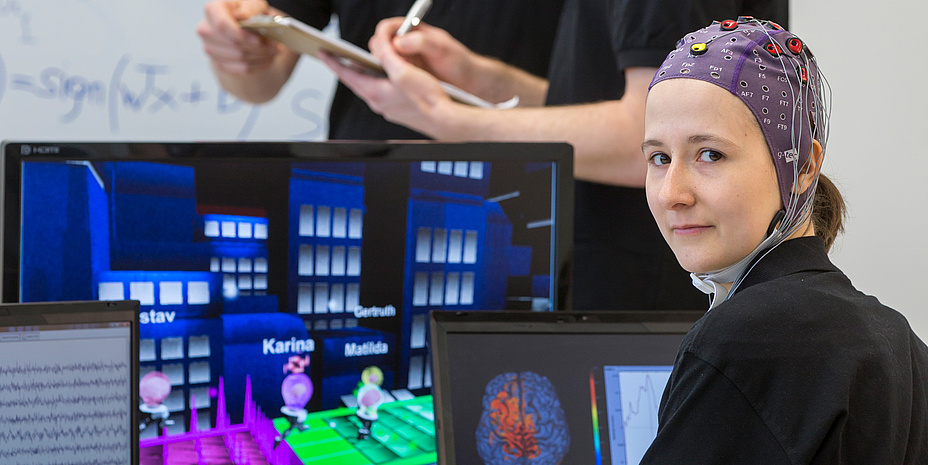The power of thought – the key to success: CYBATHLON BCI Series 2019

‘Pilots’ with physical impairments, who control computer avatars with their thoughts, will demonstrate how far brain-computer interface (BCI) research has come as they compete in live events at CYBATHLON. During the contest, which was launched by ETH Zurich, people with disabilities caused by bone marrow injury, stroke or other neurological conditions show just what robotics and neurotechnology are capable of, and how assistance technologies will be able to provide support in day-to-day life. TU Graz is hosting the CYBATHLON Series this year. “By staging this event, we’ve succeeded in bringing the BCI ‘world cup’ to Graz,” explains organiser Gernot Müller-Putz, head of the Institute of Neural Engineering at TU Graz.
The BCI race will take place at TU Graz in front of a live audience, as the ‘pilots’ use their thoughts to guide an avatar around a virtual track and reach the finishing line as quickly as possible. “We will see, under competitive conditions, which research team has developed its system and fine-tuned it to the pilot most effectively,” says Müller-Putz, a BCI expert. The challenge lies in capturing brain signals correctly, because “the ‘pilots’ can only move the avatar to the finishing line quickly if the right brain signal is sent at the right time and properly captured,” Müller-Putz adds.
Tickets now available
The CYBATHLON BCI Series is taking place on 17 September from 10am to 5.30pm in lecture theatre P1 at TU Graz’s Campus Neue Technik. The spectators will watch cutting-edge technology in action and see for themselves just how much progress has been made in BCI development. Teams from Austria, including MIRAGE 91 from TU Graz, as well as from Thailand, the UK, France and Italy will be competing. The morning programme kicks off with the qualifying runs, with the final beginning at 3pm, to be followed by the victory ceremony. CYBATHLON’s initiator Robert Riener, a professor at ETH Zurich, will give a talk about the idea behind this fascinating contest in the break between the two blocks of races. Riener launched CYBATHLON as a platform for developing assistance systems suitable for everyday use. Virtual BCI-based racing is one of six disciplines.
Tickets cost EUR 7 for school pupils, students and apprentices, and EUR 10 for adults.
Tickets and more details: eventbrite.de (German only)
From the race track to everyday life
TU Graz’s BCI working group is one of Europe’s leading research groups in the field of computer-assisted interpretation of brain waves and their translation into electrical impulses for prostheses, robotic prosthetic arms and speech output programs. So it is no coincidence that ETH Zurich’s CYBATHLON BCI Series is coming to Graz, or that the city hosts one of the most important conferences on brain-computer interfaces every two years.
The aim is that insights generated by the CYBATHLON BCI Series and other initiatives will prompt advances in BCI technology that in future will enable people with serious motor impairments to operate devices such as computers, neuroprosthetics and wheelchairs using brain-computer interfaces.
Interested in further information? Read more about the activities of the "Graz BCI Racing Team" of TU Graz in our section Talking About.
Kontakt
Gernot MÜLLER-PUTZ
Univ.-Prof. Dipl.-Ing. Dr.techn.
TU Graz | Institute of Neural Engineering
Stremayrgasse 16/IV, 8010 Graz
Tel.: +43 316 873 307000
Email: gernot.mueller@tugraz.at
ine.tugraz.at




